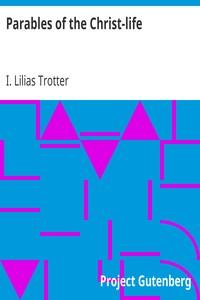Read this ebook for free! No credit card needed, absolutely nothing to pay.
Words: 11053 in 3 pages
This is an ebook sharing website. You can read the uploaded ebooks for free here. No credit cards needed, nothing to pay. If you want to own a digital copy of the ebook, or want to read offline with your favorite ebook-reader, then you can choose to buy and download the ebook.


: Parables of the Christ-life by Trotter I Lilias Isabella Lilias - Christian life; Devotional literature; Parables
f the Spirit is spirit." But our eyes are too dim at first to distinguish them in detail: with most of us it is only when the cleansing Blood has dealt with the question of known sin, and the Spirit's incoming has cleared our vision, that the two lives, natural and spiritual, begin to stand out before us, no longer shading into each other, but in vivid contrast. The word of God in the hand of the Holy Ghost pierces to the dividing asunder of soul and spirit, and we see bit by bit as we can bear it, how we have made provision for the flesh, given occasion to the flesh, had confidence in the flesh, warred after the flesh, judged after the flesh, purposed after the flesh, known each other after the flesh. The carnal nature with its workings stands out as the hindrance in the way of the Divine, and the time comes when we see that no more growth is possible to the Christ in us unless a deliverance comes here.
We are helpless in the matter. There is no system of self-repression or self-mortification that will do anything but drive the evil below the surface, there to do a still more subtle work, winding down out of reach. The roots will only strike deeper and the sap flow stronger for the few leaves trimmed off here and there. If self sets to work to slay self it will only end in rising hydra-headed from the contest. How is the deliverance to come?
The annuals give us the secret. Look back at the vetch seed-vessels. Why is it that the leaves which used to stand firm and fresh like those of the flowering clover, have begun to shrivel and turn yellow? It is because they have acquiesced wholly now in the death sentence of their new birth, and they are letting the new life live at the expense of the old. Death is being wrought out by life.
And the same triumphant power of the new life is set free as we come to accept to its utmost limits the sentence of Calvary, that "our old man was crucified with Him," in its sum-total, seen and unseen, root and branch. Christ is our Life now--our only Life--and we begin to find that He is dealing with the old creation, we hardly know how. We only know that as we bring the judgment, the motive, the aim that were ours, not His, into contact with Him, they shrivel and wither like the dying leaves. The impulses and the shrinkings of the flesh perish in His Presence alike. The new life wrecks the old. "If ye through the Spirit do mortify the deeds of the body ye shall live"--that is what the withering leaves say. We are "saved by His life."
The great North African aloe plant shows this very strikingly. It is like our annuals on a large scale, for it flowers and seeds but once in its career, though that numbers more years than these can count weeks.
Up till then its thick hard leaves look as if nothing could exhaust their vigour. The flower stalk pushes up from a fresh sheaf of them--up and up twelve or fourteen feet--and expands into a candelabra of golden blossom, and not a droop comes in the plant below. But as the seed forms, we see that life is working death, slowly and surely; the swords lose their stiffness and colour and begin to hang helplessly, and by the time it is ripe, every vestige of vitality is drained away from them, and they have gone to limp, greyish-brown streamers. The seed has possessed itself of everything.
And the meadow plants that we have been watching follow, on their small pattern, the same law.
All gives way to the ripening seed. In the grasses the very root perishes by the time the grain is yellow, and comes up whole if you try to break the stem. They "reign in life" above through the indwelling seed, while all that is "corruptible" goes down into dust below. They have let all go to life--the enduring life: they are not taken up with the dying--that is only a passing incident--everything is wrapped up into the one aim, that the seed may triumph at any cost. Death is wrought out almost unconsciously: the seed has done it all.
Can we not trace the same dealing in our souls as, slowly, tenderly, all that nourished that which is carnal is withdrawn, giving way to the forming of the Christ life in its place? His thoughts and desires and ways begin to dethrone ours as the aloe seed dethrones its leaves and casts them to the ground. "He must increase, but I must decrease."
And the outward dealings co-operate with the inward. It is just in the very corner of everyday life where God has put us, that this can take place, and the surrounding influences can have their share in bringing down to death the old nature. It is no mystical, imaginary world that draws out the latent forms of self, but the commonplace, matter-of-fact world about us.
It is in contact with others, for the most part, that the humbling discoveries of the workings of the flesh come, on the one hand, and on the other we find ourselves breaking down in one after another of our strongest points. And all these things that seem against us are really doing a blessed work--they are "the Wind of the Lord" coming "up from the wilderness" to "spoil the treasure" of all that is of former days. Everything that is "natural," good and bad alike, must go down into death before its blast, when God takes it in hand--all that we can lean upon in outward things, all clinging to the visible and the transitory; and with this result, that our arms clasp closer and closer round the Eternal Seed, Christ in us the Hope of Glory--known no longer after the flesh, but by the mighty revelation of the Holy Ghost.
All this is shadowed forth in the story of these southern plants; one day's sirocco in May will turn a field, bright with the last flowers, into a brown wilderness, where the passing look sees nothing but ruin--yet in that one day the precious seed will have taken a stride in its ripening that it would have needed a month of ordinary weather to bring about; it will have drawn infinite life out of the fiery breath that made havoc with the outward and visible.
Free books android app tbrJar TBR JAR Read Free books online gutenberg
More posts by @FreeBooks

: Evolution in Modern Thought by Bateson William Contributor Bougl C Lestin Charles Alfred Contributor Bury J B John Bagnell Contributor Haeckel Ernst Contributor H Ffding Harald Contributor Morgan C Lloyd Conwy Lloyd Contributor Schwalbe Gustav Albert Contr


: L'Illustration No. 3728 8 Août 1914 by Various - World War 1914-1918; Illustrated periodicals France L'Illustration






